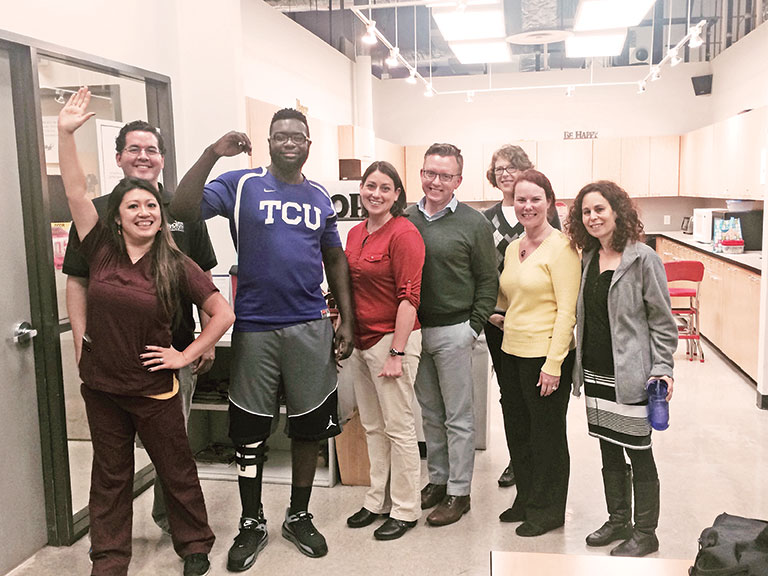
Kelubia Mabatah’s Comeback
Former TCU tennis player forges on after a traumatic brain injury.
Kelubia Mabatah ’10 survived and continues to thrive in an alternate universe that no one would welcome. Nearly two years ago, four armed men nearly killed the alumnus during a brutal assault at his family’s business compound in southern Nigeria.
The former professional tennis player suffered a fractured skull after one assailant struck him in the head with the butt of a rifle. He also was stabbed in the stomach and had several teeth knocked out. In the aftermath of the vicious attack, Mabatah spent six days in a coma.
“To me, the Old Kel died on Dec. 3, 2014, and the New Kel was born on Dec. 9, 2014, [after emerging from the coma] with a second opportunity at this thing we call life, one that we often take for granted,” Mabatah said at his home in Houston.
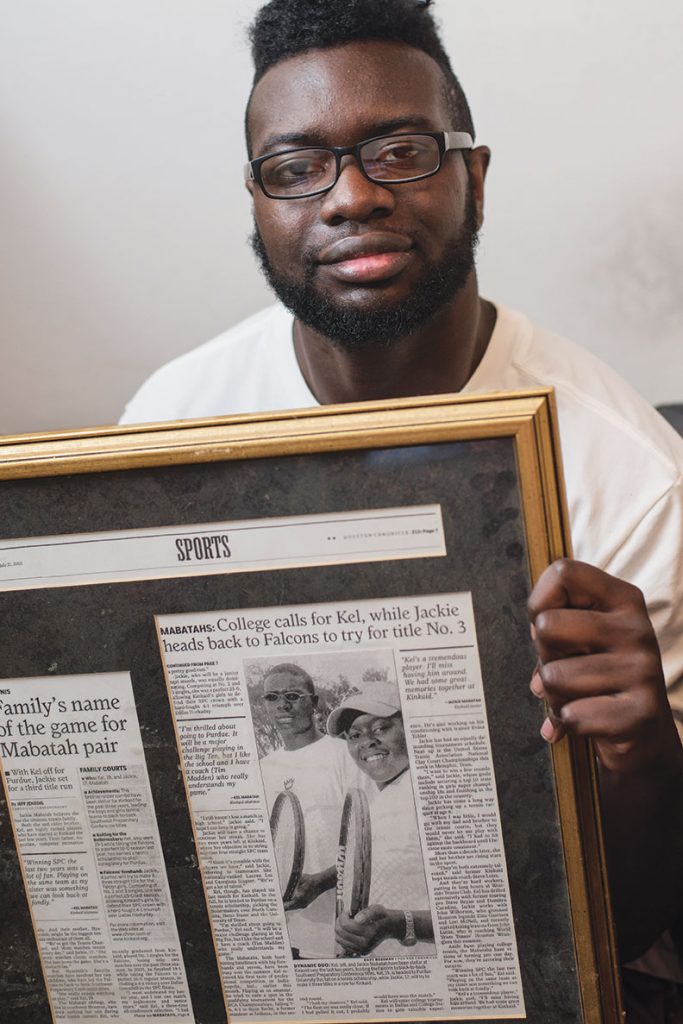
Parts of the attack Mabatah may never remember, but he cannot forget getting pushed to the floor on his hands and knees at his family’s private quarters in Agbor, a town in Delta State, the barrel of the rifle aimed at his face.
He suffered a severe traumatic brain injury. He was paralyzed on the right side, unable to walk or use his arm or hand. He lost the ability to speak.
Now that Mabatah has regained his voice, it is one of determination, faith and hope. “Without God, and without being in the physical and mental shape I was in at the time of the attack, and with all the odds that were against me that night in Nigeria, I would have never made it and survived such a horrific crime against someone.”
The December Attack
Mabatah describes the attack as “a well-planned and strategic assault, for a reason still unknown till this day.” Robbery was ruled out as a motive. “It was personal though,” he said. “Someone or some people there in Nigeria didn’t like me for whatever reason and wanted me dead.”
Four men with guns and knives stormed the Mabatah family’s business compound. The unknown assailants tied up the security guards and other employees. They collected cell phones and keys to the vehicles.
Then the attackers kicked in the door to the residential quarters and Mabatah’s harrowing ordeal began. One employee managed to free himself and escaped the compound to call for help.
“The assailants left me for dead or at least thought I was dead, but the police found me on my back in my flat and rescued me just in time,” Mabatah said.
He was rushed to the local hospital in Agbor. The next morning, he was transferred to St. Luke’s Hospital in Asaba, which is about 20 minutes away, for emergency brain surgery.

The attack on Mabatah occurred in Agbor, in southern Nigeria.
“Six days later, I woke up from a coma at the hospital, wondering where I was and why I was there,” Mabatah said. When his father arrived a few days later, Mabatah was stable enough to withstand the more than 12-hour flight home despite being paralyzed and unable to talk. He arrived at Memorial Hermann Hospital in Houston 13 days after the attack.
To date, Mabatah has endured four brain surgeries and two oral surgeries. More oral operations are to come to reconstruct his broken and missing teeth. Medical complications have included blood clots in both arms and partial hearing loss and ringing in his left ear.
He was hospitalized for three months, but he started therapy and rehab in early January 2015 at TIRR Memorial Hermann Rehabilitation Inpatient Hospital.
Mabatah has undergone intense speech, occupational and physical therapies. He continues with outpatient rehabilitation three or four days during the week and has another personal rehab program he does seven days a week on his own at the Westside Tennis and Fitness Club. “I refuse to take a day off because the first two years of recovery after suffering a severe traumatic brain injury are the most important for a full recovery.”
The way back
Mabatah works with a neuropsychologist to deal with the traumatic effects of the 2014 assault. He also attends two brain injury support groups. One group is spiritually based and led by chaplain Hazel Rhodes Thomas ’90, a Neeley School alum.
“I know others who have been attacked,” said Thomas, who has been a rehab manager for 10 years and a chaplain for 20. “The stories are always horrendous.” The common theme is brain injury can happen to anyone. “It’s always unexpected,” she said. “Once it does occur, there is a grief process involved, because something has been lost.”
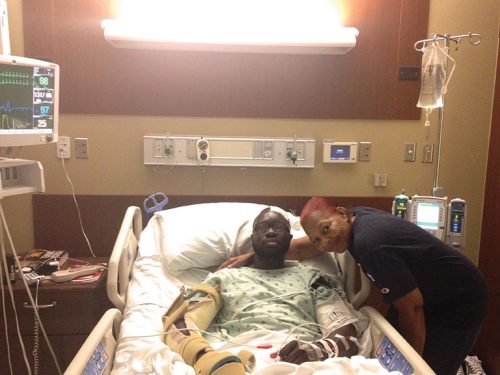
Kelubia Mabatah rests in a hospital bed with his mother by his side after his fourth brain surgery on July 17, 2015. (Courtesy photo)
The conversations are aimed at reconnecting patients with their lives again. “What we talk about is ‘how is your spirit, your outlook, your perspective, how are you coping,’” said Thomas. People react differently, depending on the situation. The experienced chaplain has dealt with the anger of returning soldiers from Iraq and Afghanistan and the gratitude of brain injury and stroke survivors who are simply happy to have a life left.
“In Kel’s specific case, he really hasn’t had that much anger,” Thomas said, though he attempted early on to find the people responsible for the attack and the reason why.
“He didn’t talk about it much in the first three to six months. He has learned to cope well and has decided to put his energies into something much more positive than anger,” Thomas said. “After awhile it was like, ‘this isn’t worth my time or energy.’ He and his mom both kind of let that go, like it’s not in our hands anymore.”
“Through my hard work and determination it is only a matter of time before I am physically back to normal.”
Kelubia Mabatah
As the brain heals very slowly, Mabatah said there is no timetable for full recovery. “All the doctors and therapists just tell me to keep working hard and to stay positive, that everyone and their kind of brain injury is different.”
Mabatah still works to regain full use of his right arm and right leg, but there is still no movement in his right hand and fingers. With injuries like his, this is expected because that type of movement is usually the last to return.
“My memory is solid and my brain is okay cognitively and mentally,” he said. “My speech is still coming along, and through my hard work and determination it is only a matter of time before I am physically back to normal.”
Mabatah credits his mother, who has ancestral roots in Jamaica, with his rehabilitative success. He also maintains “a joyful sense of humor throughout all of this.”
A Love of Tennis Drives a Recovery
“I started playing tennis when I was 5,” Mabatah said. “On Sundays I used to go play with my friends. I really liked it so my mom took me to Westside Tennis Club and it took off from there.” Ironically, he is once again spending most days at Westside Tennis and Fitness Club. Only this time, the former tennis standout is doing a self-directed rehabilitation program in addition to his clinical rehab sessions.
From age 12 through college, tennis was Mabatah’s consuming passion. “I liked the one-on-one competition,” he said. “It’s a sport that you get out of it what you put in, and I liked that as well.”
Mabatah graduated from the Kinkaid School, a private prep school in Houston. He was a captain of his school’s tennis team and won All-Southwest Preparatory Conference honors for three years. The team won conference championships during his junior and senior years.
After high school, Mabatah attended Purdue University on a tennis and academic scholarship until his junior year, when he was sidelined with two elbow surgeries. He reached out to a former Purdue teammate who was on the tennis coaching staff at TCU at the time. Mabatah transferred to TCU and played two years, and both years the tennis team won conference championships.
“After graduating from TCU, I spent about a year playing tennis professionally, but eventually retired from the sport to pursue a different career path,” he said. “Over the next four years, I got involved with the family business in Nigeria working alongside my father, learning the ins and outs of the business and managing the company.”
“This is only a temporary setback. God has a much bigger purpose for me, one greater that I could ever have imagined before this happened.”
Kelubia Mabatah
Having been an athlete for such a long time gave Mabatah tools he needed to face the rigors of recovery. “In tennis, everything is how to work, setting goals, doing everything possible to reach those goals, building mental toughness and discipline,” he said. “Right now, I just focus on my rehab and therapy. It’s my full-time job. I do anywhere from six to 10 hours a day. I can’t drive or do the things that would be necessary to work a job. My one job right now is to get better.”
Mabatah lives with his parents. “My friends, my family help me keep my spirits up. Just keeping a positive attitude at all times. It could be a lot worse,” he said. “This is only a temporary setback. God has a much bigger purpose for me, one greater that I could ever have imagined before this happened.”
The TCU Connection
Mabatah credits his time in Fort Worth and at TCU for helping him get through the attack and its aftermath. “I was just drawn to the coaches and players on the team, and the business school as well,” he said. “And Fort Worth, I liked my time there, it was a fun little city, a lot closer to home, and the weather was much nicer than Purdue.”
Friends, teammates and coaches from TCU keep up with Mabatah’s recovery milestones. They continually offer support and motivation. “Being at TCU, especially in the Neeley School, I learned teamwork,” he said. “The life skills I learned as a college athlete at TCU, completing course work and learning how to spend my time, I learned to choose a positive attitude after a tough loss and to never give up.”
Mabatah envisions forming a foundation to aid the physical and mental recovery of people with traumatic brain injuries. He has started writing a book about his recovery experience “to help motivate and inspire others in their time of struggle,” and he would like to become a motivational speaker.
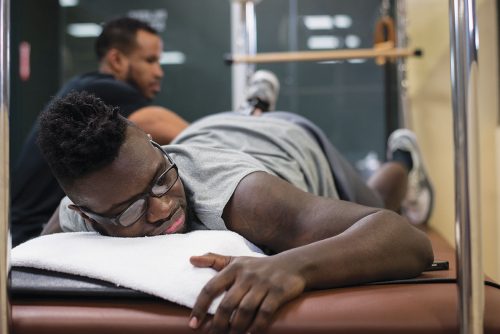
Mabatah works on his lower legs in physical therapy multiple times a week at the tennis center.
Thomas asked Mabatah to lead one of the support group sessions at Memorial Hermann’s outpatient facility. “I told him, if he wants to be a motivational speaker he had to get out in the public and do that,” Thomas said. “He put together material and facilitated the group that day.”
Another breakthrough has helped Mabatah forge ahead with his plans. “Since May of last year, I can type with my left hand on my iPad. My job is to write down everything I want to say, recount my journey and recovery from almost being killed,” he said. “My plan moving forward is to devote my new life to helping others around me who have had life-changing experiences.”
Though his passion for tennis took a hit after the attack, those dreams aren’t abandoned either. “I hope to be able to get back on the tennis court and play tennis again sometime in the near future,” Mabatah said.
Thomas stands witness to her fellow alum’s determination. “He’s definitely a hard worker. The fact that for six days a week, sometimes seven, he’s working on his recovery, not everybody does that,” she said. “Being young is a positive after such a traumatic experience.”
Mabatah’s desire to be an example to help others who are also dealing with life-changing circumstances is another strong point, Thomas said. “It’s not so much about him, or that he wants sympathy,” she said. “He just wants to tell people that they can survive.”
Follow Kelubia Mabatah’s Journey on Instagram



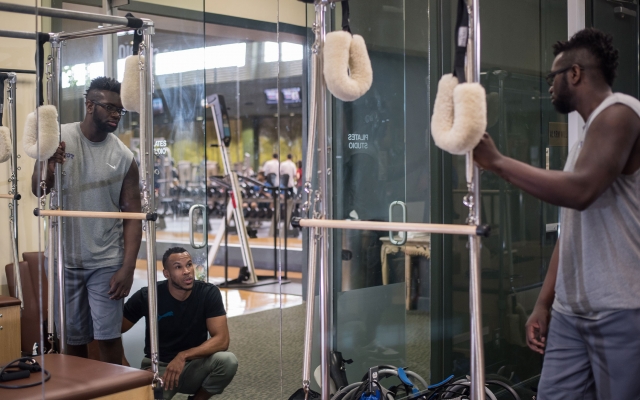

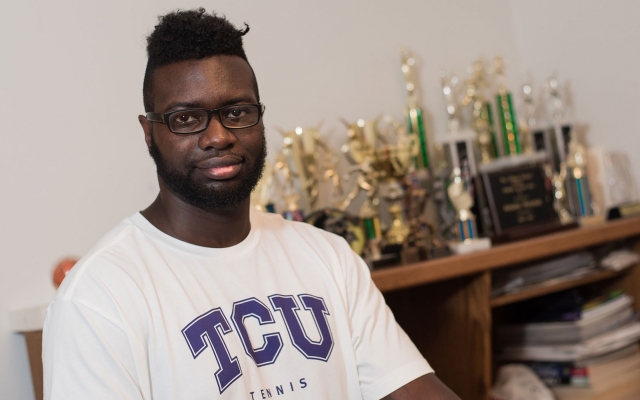
Your comments are welcome
2 Comments
Thanking GOD for you and your complete healing and recovery.
Praying for a full recovery. You are such an inspiration to the world. Continue to share your story – especially with young people.
Related reading:
Features
Our Marching Band, the Pride of TCU
In its 111th year, the band still practices hard, relies on teamwork and performs with passion.
Alumni, Features
The gift of life
Ravaged by renal failure and dialysis, John Medrano ’90 was worn out and resigned to death. As he neared the inevitable, he found a donor from an unlikely source — classmate Hazel Rhodes Thomas ’90.